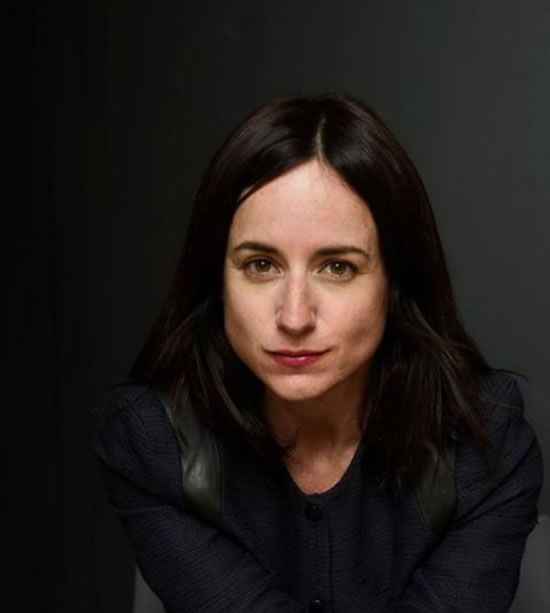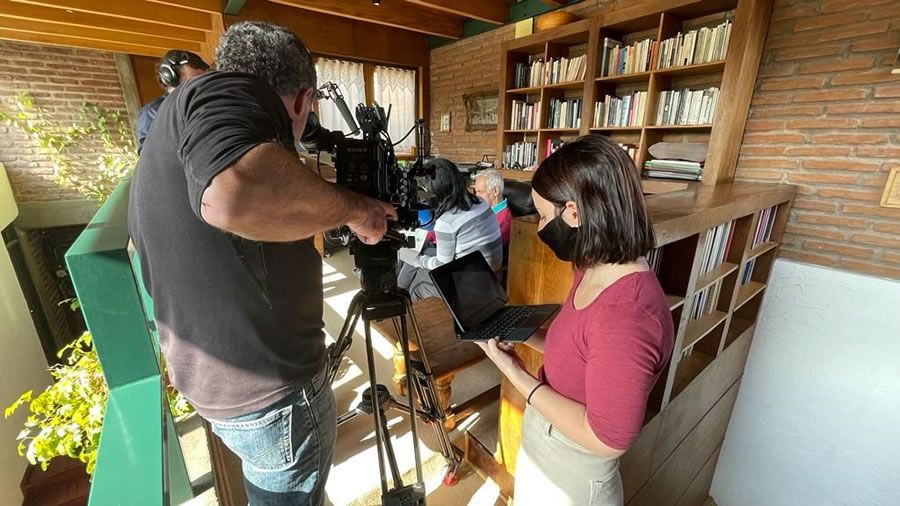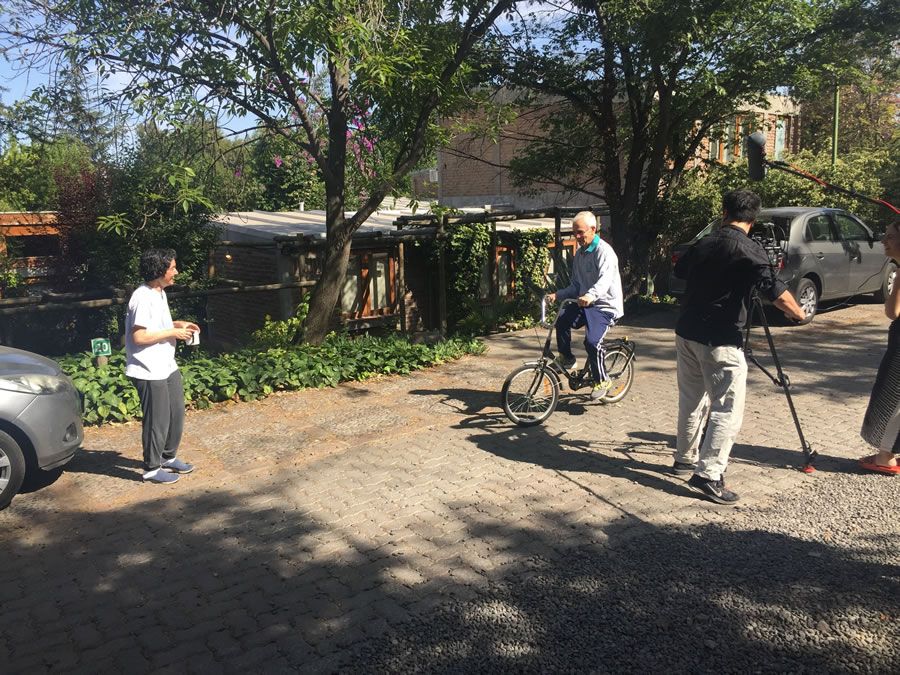08/12/2023
The Eternal Memory: Interview with Maite Alberdi. 'It was a film that was written in the editing room.'
By Sandra M Ríos U
Twitter: @sandritamrios
"I want to understand that society will evolve by collectively caring for the sick, children, or mothers with their kids."
Since her first feature film 'The Lifeguard,' Chilean filmmaker Maite Alberdi has demonstrated her great ability to tell stories that touch the audience's emotions, with always kind perspectives that offer deep reflections, and by blending her documentaries closely with fiction.
After being nominated for an Oscar in the Best Documentary category for her tender portrayal of aging – a recurring theme in her filmography – within a nursing home, international attention focused on what her new production would be.
'La memoria infinita' exceeds all expectations and is the most moving of her observational cinema – which is saying a lot considering how easy it is to shed tears with her stories. In this film, an ode to love, themes such as memory, romantic love, illness, and the vulnerability of aging come together. The story follows the daily life of the recognized Chilean couple, Augusto Góngora and Paulina Urrutia – he, a journalist, and she, an actress and former culture minister – as they confront Augusto's Alzheimer's disease. What sets this film apart from others of its kind is how Paulina, as the caregiver, integrates her husband into her work routine and how, in their intimacy, they make ingenious efforts to continue nurturing their relationship.
I spoke with Alberdi about the film's release this weekend in the United States and its upcoming premiere in Chile at the end of the month.
- As prominent figures in Chile, how did the protagonists react to your proposal? What fears did they express or what limitations did they impose?

I think the two of them had very different approaches to the film. Augusto was very clear from day one that he wanted to do it, and Paulina had doubts because she is an actress and knows how cameras work. Both of them knew what it's like to be publicly exposed, so it was difficult for them. They had many doubts, we talked a lot about it, and in the end, it was Augusto who convinced her. Paulina says that she feels the film is Augusto's most consistent act in recording his own vulnerability because he used to say that he had documented so much fragility in his life that he couldn't help but show his own fragility.
- With 'The Mole Agent,' I said that it was a live example of the art of cultivating patience when making a documentary. You shot 'La memoria infinita' over four years. Let's talk about how you approach these long observational film processes.
I believe that what needs to be understood about observational processes is that they are not all the same, and with each character and each film, you see what they need and how much observation time they require. In this case, it was indeed a process of almost five years, although I wasn't filming every day, so it was different from 'The Mole Agent' where we had to be there every day due to the undercover element. In this case, we filmed three times a month throughout these years, and during the pandemic, Paulina grabbed the camera and filmed more frequently. Here, it was clear that the film would be shot over the years and over time, and we wanted, or I wanted, to portray this relationship with time; hence, the dimension of time.
- Since these processes are so long, do you engage in one project to jump into another, or did you work on them simultaneously with 'The Mole Agent'?
Yes, I was editing 'The Mole Agent' when I started filming this project, so they do run in parallel because it's not the same intensity as a fiction project where you can't do anything else but immerse yourself in it. With 'The Mole Agent,' obviously, I couldn't do anything else, but with other projects that involve long-term engagements, you can work on them in parallel and they intertwine.
- Do you believe that Paulina's perspective, when she took the camera and filmed part of the movie, contributed to the high level of intimacy and emotion that it achieves right from the start?
Absolutely! Paulina taking the camera clearly allowed for a level of intimacy that, even though I had full access to film them, is the kind of intimacy only a couple can have without anyone else present in the room or the house. So, I think it gives a tone that would have been very difficult for any documentarian to achieve, even for me with all the access I had. The interesting thing about that intimacy, which I believe is the essence of 'La memoria infinita,' is that they have a very tender, very humorous relationship. Despite the difficulties, they are still enjoying themselves, and you can feel that from the first scene when he wakes up in the middle of the night, doesn't remember anything, and instead of it being a tragedy for her, she takes it with humor, tells him who he is, where they are, and they laugh. He can't believe where he is and he's fascinated by what she's telling him about his life. So, that sense of wonder and tenderness, I think, is the key to the film.

- You mentioned that you took a leap of faith with this documentary by not knowing exactly how you would begin it, how it would evolve, how far you could go, and what the ending would be. How did you manage that uncertainty to capture those key moments in the story and then give them structure during editing?
Yes, well, the film unfolds during editing, clearly, and there was no logical order, no single way to tell it. I imagine any editor or director who had access to the material might have edited it differently, because there was no logic, no traditional structure. The editing process was an associative search for how the images dialogued with each other – present, past, future – without a linear timeline, and that took quite a bit of time in the writing stage. It was a film that was written in the editing room.
- Memory is an important theme in the film, with a dual meaning: personal memory and collective memory embodied in a single character. Let's talk about what Augusto represents in the story.
Yes, that's a big metaphor of the film about that, and it was also a surprise for me because I discovered that line, that obsession, concern, or awareness of preserving memory. I think Augusto is a person who never forgot many things. 'La memoria infinita' invites us to reflect on what is transmitted from historical memory and what remains.
- The other focus of the film is on the sick and the caregivers. In Colombia, there was a good tribute to caregivers with 'Patient.'
Yes, I remember that. Whose was 'Patient'? Jorge's?
Jorge Caballero's, yes.

- With that theme, the film breaks down the taboo that illness should be hidden, that society should isolate itself from it. Was this message a conscious idea you wanted to convey?
Absolutely! That was the initial approach, and the idea of the film's content was framed from there – from the perspective of caregiving and how it's a new way of understanding care. But that's not the central theme of the film for me, because it has many layers and many things happening. One of those layers is about caregiving. Here, we see a woman who decides to integrate her partner into her social and work life, taking him to work, and her colleagues have to care for him with her. She wants to make him visible and wants him to socialize, so it's a kind of care that isn't based on isolation but involves an entire society and a group that has to adapt and care together, progressing at a different pace, without hiding, neither herself nor the patient. So, I think that's innovative – something I hadn't seen before – and it's the way I want to understand that society will evolve by collectively caring for the sick, children, or mothers with their kids. So that care isn't solely the responsibility of the caregiver. I think that's what Paulina does – an intuitive and very wise decision.
- In 'La once,' 'The Mole Agent,' and now in 'La memoria infinita,' you've depicted old age. What's the particular interest behind this?
I believe it's an age where one has already experienced everything. Many changes are happening; there's wisdom and fragility, and a desire to do things that can't be done anymore. It's a convergence of many contradictions in life at that moment, and one is confronted with palpable changes. I think in cinema, we have to show change, and this is an age where a lot is happening and where there are countless possible themes. It depends on the group you work with and the focus you choose – so, there isn't just one message to convey within that social group.
- You're premiering this weekend in the United States and at the end of the month in Chile. Will we be able to see the film on Netflix or in the rest of Latin America? They already have 'La once' and 'The Mole Agent,' as well as 'The Lifeguard' and 'The Grown-Ups.'
I can't say anything yet, but it will be available, that much I can say.

- That's wonderful! Great news! One last question. Augusto passed away last May, and we've heard a lot about him and Paulina. How have Augusto's children viewed the film, and what are their expectations now that it's premiering in Chile?
The film will be released there on August 24th, and yes, they're very proud of the film. They're very happy and believe it's a great legacy for their father – they feel he's well represented.
- Maite, thank you very much. I've wanted to talk with you for a while now.
Thank you, Sandra, for this time. Thank you very much!
<< Go to Spanish version
